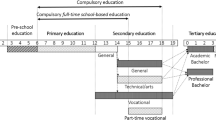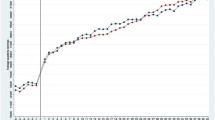Abstract
The relationship between academic achievement and the financial success of baccalaureate recipients in the workplace is the focal point of an investigation that covers the first 3 years following graduation. Employment activity and quarterly earnings of university baccalaureate recipients were tracked in a comprehensive study that merged state unemployment insurance records with student data files. Quarterly earnings were regressed on grade point averages while controlling for age, registration type (native vs. transfer), major, gender, race, and industry. Patterns were discovered over the 3 years following graduation. Grade point average had little impact on earnings, as did registration type. Age, major, and industry were found to be significant. Gender and race held no significance. In an attempt to further explore the relationship between academic achievement and workplace success, a two-way ANOVA, repeated measures design was used to examine differences in the individual earnings of high academic achievers and low academic achievers over a 3-year period. No significant between-group effects were found.
Similar content being viewed by others
REFERENCES
Astin, A. W. (1977). Four Critical Years, Jossey-Bass, San Francisco.
Baird, L. L. (1985). Do grades and tests predict adult accomplishment? Research in Higher Education 23: 3-85.
Barcikowski, R. S. (1995). Repeated measures analysis. Unpublished manuscript.
Becker, G. S. (1964). Human Capital: A Theoretical and Empirical Analysis, with Special Reference to Education, National Bureau of Economic Research, New York.
Blaug, M. (1991). An Introduction to the Economics of Education, Gregg Revivals, Aldershot.
Bowles, S. (1970). Towards an educational production function. In: Hansen, W. L. (ed.), Education, Income, and Human Capital, Columbia University Press, New York, pp. 11-61.
Brown, C. L., and Choy, S. P. (1988). Information disclosure in postsecondary vocational education: Possibilities and practices. (ERIC No. ED 315517)
Cohen, P. A. (1984) College grades and adult achievement: A research synthesis. Research in Higher Education 20: 281-293.
Collins, R. (1974). Where are educational requirements for employment highest? Sociology of Education 47(4): 419-442.
Cooperative Institutional Research Program (CIRP; 2001). Cooperative institutional research program survey, Higher Education Research Institute, UCLA, Los Angeles.
Friedlander, J. (1993). Using wage record data to track the post-college employment and earnings of community college students. (ERIC No. ED 360007)
Goodman, J. D. (1979). The economic returns of education: An assessment of alternative models. Social Science Quarterly 60(2): 269-283.
Hansen, W. L. (1970). Education, Income, and Human Capital, Columbia University Press, New York.
Holland, J. (1997). Making Vocational Choices: A Theory of Vocational Personalities and Work Environments, Psychological Assessment Resources, Odessa, FL.
Jencks, C. (1979). Who Gets Ahead? The Determinants of Economic Success in America, Basic Books, New York.
Koch, J. V. (1972). Student choice of undergraduate major field of study and private internal rates of return. Industrial and Labor Relations Review 26(1): 680-685.
Monk-Turner, E. (1990). The occupational achievements of community and four-year college entrants. American Sociological Review 55(5): 719-725.
Pascarella, E. T., and Terenzini, P. T. (1991). How College Affects Students: Findings and Insights from Years of Research, Jossey-Bass, San Francisco.
Peterman, D. (1999). Measuring the economic benefits of community college attendance using community college, unemployment insurance, and state agency data. (ERIC No. ED 433076) http://www.ed.gov/databases/ERIC_Digests/ed433076.html
Phelan, T. J., and Phelan, J. C. (1983). Higher education and early life outcomes. Higher Education 12: 665-680.
Raudenbush, S. W., and Kasim, R. M. (1998). Cognitive skill and economic inequity: Findings from the National Adult Literacy Survey. Harvard Educational Review 68: 33-79.
Rawlins, V. L., and Ulman, L. (1974). The utilization of college-trained manpower in the United States. In: Gordon, M. S. (ed.), Higher Education and the Labor Market, McGraw-Hill, New York, pp. 195-235.
Sanchez, J. R.; Laanan, F. S.; and Wiseley, W. C. (1999). Postcollege earnings of former students of California community colleges: Methods, analysis, and implications. Research in Higher Education 40: 87-113.
Schultz, T. W. (1961). Investment in human capital. The American Economic Review 51(1): 1-17.
Schultz, T. W. (1964). The Economic Value of Education, Columbia University Press, New York.
Smart, J. C. (1988). College influences on graduates' income levels. Research in Higher Education 29: 41-59.
Smart, J. C., Feldman, K. A., and Ethington, C. A. (2000). Academic Disciplines; Holland's Theory and the Study of College Students and Faculty, Vanderbilt University Press, Nashville.
Solmon, L. C.; Bisconti, A. S.; and Ochsner, N. L. (1977). College as a Training Ground for Jobs, Praeger, New York.
Wonacott, M. E. (2001). CTE contributions to learning and earning. In brief: Fast facts for policy and practice. (ERIC No. ED 450229)
Yang, X., and Brown, J. K. (1998). Using unemployment insurance data and job record data to track the employment and earnings of community college students. AIR 1998 Annual Forum Paper. (ERIC No. ED 422831)
Author information
Authors and Affiliations
Corresponding author
Rights and permissions
About this article
Cite this article
Donhardt, G.L. In Search of the Effects of Academic Achievement in Postgraduation Earnings. Research in Higher Education 45, 271–284 (2004). https://doi.org/10.1023/B:RIHE.0000019590.58766.af
Issue Date:
DOI: https://doi.org/10.1023/B:RIHE.0000019590.58766.af




